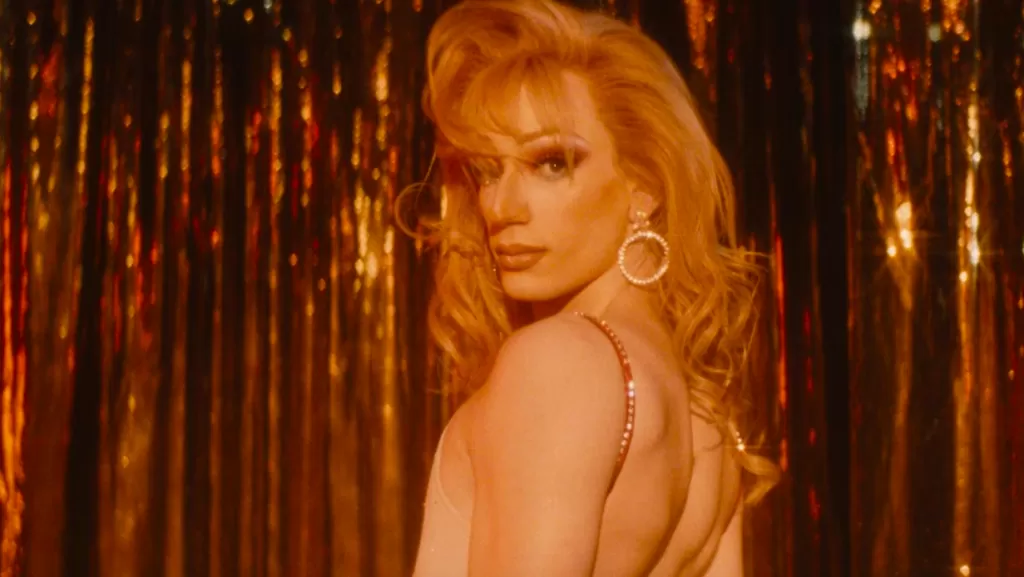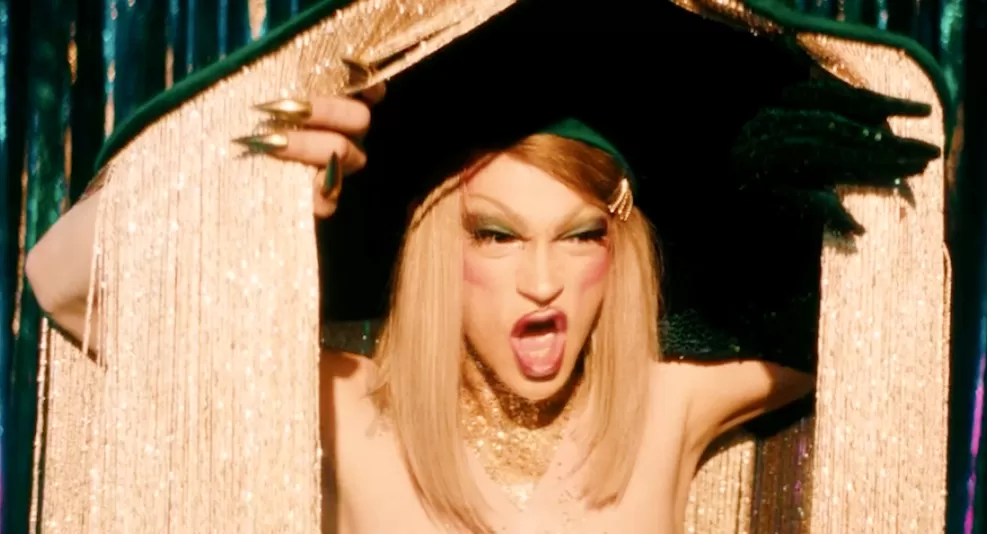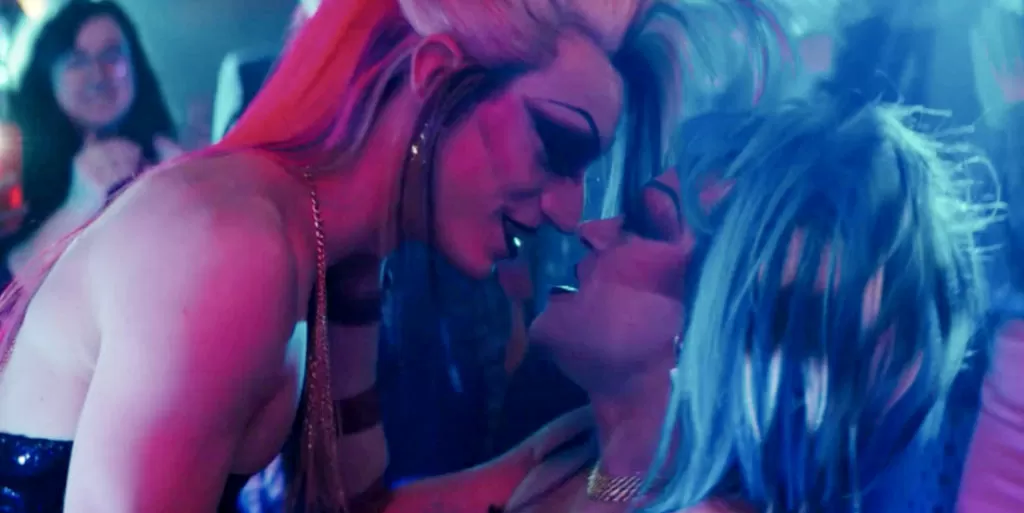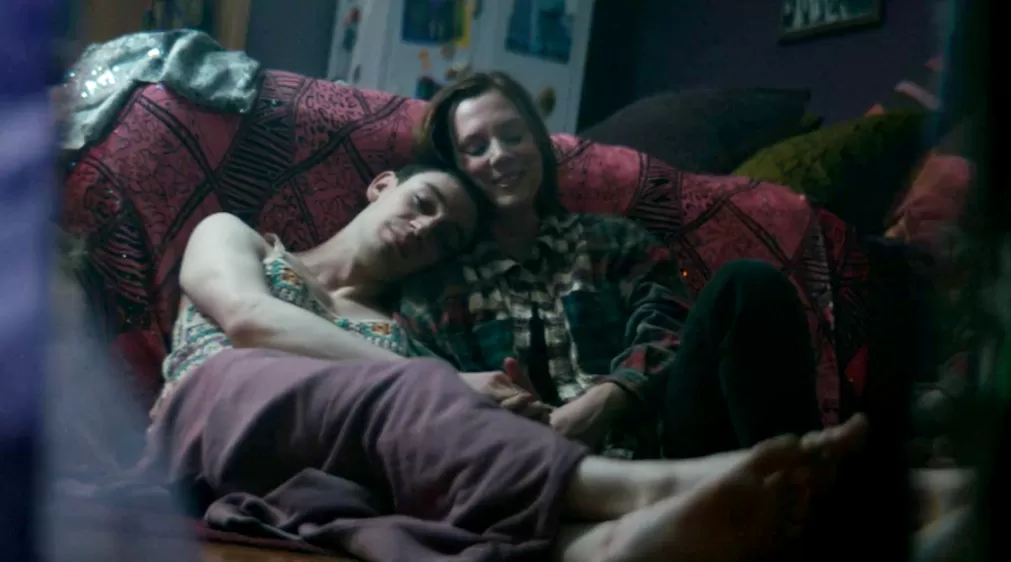
A feature film by Sophie Dupuis, Solo immerses us in the world of a Montreal drag queen cabaret and pits its main character against two toxic love affairs. It stars Félix Maritaud in what is arguably the most detestable role of his career.
Montreal. Simon (Théodore Pellerin) is a sweet and passionate young man: he spends most of his free time preparing for his drag performances. Every time he performs in the cabaret where he works alongside other queens, he causes a sensation. His sister Maude (Alice Moreault), a seamstress with whom he shares a close relationship, often makes him beautiful outfits and supports him fully. Simon lives alone and regularly visits his father, who has started a new life with a new partner after Simon’s mother abandoned her entire family to focus on her career as a successful opera singer.
One evening, Simon’s father tells him that his mother (Anne-Marie Cadieux) will be staying in Montreal for a while as she will be performing several shows there. Simon is delighted to see her again, full of admiration for her. His sister Maude is more reserved and cannot forgive her mother for having completely neglected her family to focus on her professional life.
This return of the mother comes as Simon has just made an important new encounter: he experiences a real love at first sight for Olivier (Félix Maritaud), a newcomer to his cabaret whose queen name is Dragona. From the outset, the two boys seem to understand each other, share an intimacy that is both tender and burning, and are brought together by their shared love of drag. They collaborate together, begin to put together duet acts… Olivier is demonstrative, Simon gets excited, and introduces him to his family.
Alas, after the initial passionate moments, the veneer gradually cracks. Olivier slowly but surely reveals himself to be very toxic: he doesn’t like the bond Simon has with his sister and manages to keep them apart, he makes him jealous by regularly flirting with one of his friends from the cabaret, he plays hot and cold, and begins to dictate how he should do his drag. Every time Simon tries to fight back, Olivier makes him feel guilty and exerts an increasingly all-consuming influence over him.
And it is not with his mother that Simon will be able to find comfort: the latter has not changed much and will still reveal herself to be very selfish.
How do you react to people you love (in your romantic relationships as well as in your own family)? Simon will gradually lose his footing…




A very pleasant surprise, this feature film, which strangely did not benefit from a theatrical release in France and which we discover directly on VOD. Sophie Dupuis’ film is not lacking in qualities. It already deploys a very beautiful staging, well served by careful photography. The passages of everyday life (with rather cottony tones) contrast with the life of the night, the wonder and excesses of the drag queen cabaret. The drag shows are filmed with a certain breath and Théodore Pellerin and Félix Maritaud really invested themselves to become true queens of the night, performing very effective numbers.
The world of drag serves as a backdrop here. At no point are the queens confronted with obtuse outside views. In Solo, drag is perfectly integrated into everyday life, and this brings a certain welcome freshness. This art form, which has become more democratic and gained popularity in recent years, is presented as a space for creation and freedom. However, it can still be a little snubbed by some (like Simon’s mother, an opera artist, who, we sense, has a falsely benevolent and slightly contemptuous look). Like any artistic discipline, drag can involve solidarity, exchanges, and give rise to friendships, romances, but also rivalries. Taking place in the world of nightlife and parties, it can also quickly lead fragile beings to lose themselves: after the shows, people often go to parties, drink, or even do drugs.
Simon, the main character, seems to be on a knife edge. He loves his art, but he’s unwittingly searching for affection. Affection that his mother didn’t give him enough of, and that he hadn’t found in a boy before Olivier. Unfortunately, we quickly realize that he’s drawn the wrong number.


The film’s main theme is the toxic bonds we can fall victim to when we love the wrong people. Unlike his sister Maude, Simon struggles to come to terms with the conclusion that his mother shouldn’t have a place in his life because she’s deeply selfish. But above all, he lets himself be overwhelmed and consumed by his love for Olivier. Félix Maritaud plays a difficult character here, frankly detestable, with harsh behavior and words. We want to slap Olivier for a good half of the film, and seeing Simon let it happen is particularly painful.


As the title of the feature film suggests, the key is in learning to live “Solo.” Will Simon be able to accept that sometimes it’s better to be alone than in bad company? Will he be able to escape the toxic relationships that surround him? These are the big questions posed by this very sensitive, touching, and endearing film, between the sexy and glam of drag and the hangovers of everyday life.





